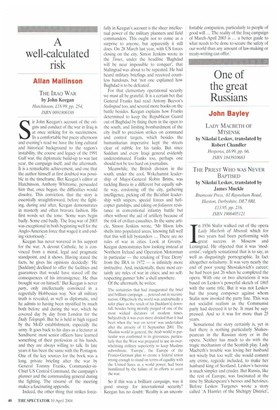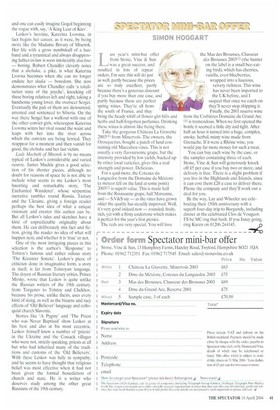One of the great Russians
John Bayley
LADY MACBETH OF MTSENSK by Nikolai Leskov, translated by Robert Chandler Hesperus, £6.99, pp. 66, ISBN 1843910683 THE PRIEST WHO WAS NEVER BAPTISED by Nikolai Leskov, translated by James Muckle Bramcote Press. 81 Rayneharn Road, Ilkeston, Derbyshire, DE7 8R1, £13.95, pp. 216, ISBN 1900405121 In 1936 Stalin walked out of the opera Lady Macbeth of Mtsensk which for two years had been performing with great success in Moscow and Leningrad. He objected that it was 'modernist', vulgarly sensational that is to say, as well as disgustingly pornographic. In fact altogether nekultumy. It was very nearly the end of poor young Shostakovich's career: he had been just 26 when he completed the opera. With one or two alterations it was based on Leskov's powerful sketch of 1865 with the same title. But it was not Leskov but the young composer against whom Stalin now invoked the party line. This was not socialist realism as the Communist party had decreed it to be. It must be suppressed. And so it was for more than 25 years.
Sensational the story certainly is, yet in fact there is nothing particularly Shakespearean in the Russian story or in the opera. Neither has much to do with the tragic mechanism of the Scottish play. Lady Macbeth's trouble was loving her husband not wisely but too well: she would commit any crime, regicide included, to make her husband king of Scotland. Leskov's heroine is much simpler and cruder. But Russia, like the rest of Europe, was fascinated at the time by Shakespeare's heroes and heroines. Before Leskov Turgenev wrote a story called 'A Hamlet of the Shchigry District', and one can easily imagine Gogol beginning the vogue with, say, 'A King Lear of Kiev'.
Leskov's heroine, Katerina Lvovma, in fact begins her career, as it were, by being more like the Madame Bovary of Mtsensk. Her life with a gross numbskull of a husband and a tyrannical and always disapproving father-in-law is soon intolerably skuchno — boring. Robert Chandler cleverly notes that a shchuka, a pike, is what Katerina Lvovna becomes when she can no longer endure her skuka boredom. She now demonstrates what Chandler calls 'a totalitarian state of the psyche', knocking off these boring relatives left and right, taking a handsome young lover, the overseer Sergei. Eventually the pair of them are denounced, arrested and sentenced to Siberia. On the way there Sergei has a walkout with one of the other convict girls, whereupon Katerina Lvovma seizes her rival round the waist and leaps with her into the river across which the convicts are being ferried, They reappear for a moment and then vanish for good, the shchtdca and her last victim.
Lady Macbeth of Mtsensk is by no means typical of Leskov's considerable and varied oeuvre. James Muckle gives a good selection of his shorter pieces, although no doubt for reasons of space he is not able to include what seems to me Leskov's most haunting and remarkable story, The Enchanted Wanderer', whose serpentine narrative rambles round Russia, Tartary and the Ukraine, giving a foreign reader perhaps the best idea of what a unique visionary and creator this author can be. But all Leskov's tales and sketches have a kind of unpredictable originality about them. He can deliberately mix fact and fiction, giving the reader no idea of what will happen next, and whether it is 'true' or not.
One of the most intriguing pieces in this selection is the author's 'Response' to Tolstoy's famous and rather odious story The Kreutzer Sonata'. Leskov's piece of criticism done in imaginative form, a story in itself, is far from Tolstoyan language. The doyen of Russian literary critics, Prince Mirsky, wrote that Leskov is quite unlike the Russian writers of the 19th century. from Turgenev to Tolstoy and Chekhov. because his prose, unlike theirs, uses every kind of slang, as well as the bizarre and racy effects of 'Old Believer' language and colloquial church Slavonic.
Stories like 'A Pygmy' and 'The Priest who was Never Baptised' show Leskov at his best and also at his most eccentric. Leskov himself knew a number of 'priests' in the Ukraine and the Cossack villages who were not, strictly speaking, priests at all but who had inherited many of the traditions and customs of the 'Old Believers'. With these Leskov was fully in sympathy, and he seems to have thought that religious belief was most effective when it had not been given the formal benediction of church and state. He is a writer who deserves study among the other great Russians of the 19th century.



































































 Previous page
Previous page